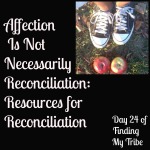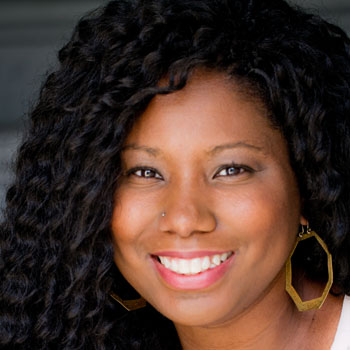This was one of the hardest lines to write in my last post, but one of the truest. Fond feelings, those, “you go, girl” comments, or even sharing belly laughs do so much to break down barriers, but most of the time, it’s not enough. What I’m learning and what I’m realizing is woefully absent in my life is safety to have honest conversations about race and privilege in my cross-cultural relationships. Maybe, it’s my fault. I’ve probably been too wimpy to invite my white friends to ask “silly” questions about my hair, my experience as a black girl in the South, or the complications of a mixed race marriage. I’ve been too afraid of causing discomfort that I’ve hidden this part of my heart from my friends and told myself I was reconciling as long as I was loving well. But Christ-like love is self-sacrificial, it looks like the cross, and it’s incredibly “un-comfortable”. To reconcile our relationships, we need this cruciform, cross-shaped love that’s willing to sacrifice comfort for authentic connection.
I’m still learning, so I invite you to learn with me today. I’m excited to connect you with a few of my favorite teachers on racial reconciliation.
First, a word on reconciliation from the CCDA website:
The question is: Can a gospel that reconciles people to God without reconciling people to people be the true gospel of Jesus Christ? A person’s love for Christ should break down every racial, ethnic and economic barrier. As Christians come together to solve the problems of their community, the great challenge is to partner and witness together across these barriers in order to demonstrate our oneness in Christ. Christian Community Development recognizes that the task of loving the poor is shared by the entire body of Christ, black, white, brown, and yellow; rich and poor; urban and suburban; educated and uneducated. While the Bible transcends culture and race, the church is still having a hard time with living out the reality of our unity in Christ. Christian Community Development is intentional about reconciliation and works hard to bring people of all races and cultures into the one worshiping body of Christ.
Next is Christena Cleveland, an intelligent and bold voice on racial reconciliation in the Kingdom
From her about page:
Christena Cleveland is a social psychologist with a hopeful passion for overcoming cultural divisions in groups. Drawing from a vast body of research, she uncovers the underlying processes that affect relationships within and between groups and helps leaders understand how to promote an appreciation for diversity and build effective collaborations with diverse groups. She recently completed her first book Disunity in Christ: Uncovering the Hidden Forces that Keep Us Apart.
This is a beautiful and important piece on the power of feeling each other’s pain:
Christians of all colors must listen to each other’s stories, learn of each other’s pain and take up each other’s causes. One important step is to gather in culturally diverse groups to watch films like 12 Years A Slave (and other films that highlight various cultural histories/experiences), and create spaces for us to discuss topics like slavery’s enduring legacy of inequality in the U.S.*** In doing so, we begin the process of expanding our sense of self to include people who are culturally different than us and allowing our souls to be pierced with the irons of the unjust experiences of our brothers and sisters.
This is an excerpt from her book, Disunity in Christ”, that I’m excited to read next month. This is on the the search of identity and significance.
Our self-image and identity are at stake here. Groups that affirm who we are can help us to defend the assaults we are already dealing with. In this sense, groups can serve as havens for our afflicted selves, and for a few fleeting moments, we feel better about ourselves.
Christena also compiles a list of the best articles and blog posts on the web in her Reconciliation Replay posts. These have been an invaluable help to me in processing my role as a peacemaker and seeking of Shalom in my relationships.
I’ve recently begun reading, Austin Channing Brown. But she’s wonderful and such an encouragement to me.
This post “For the Onlies” had me in tears.
To the only black girl in her school batting away swinging ponytails while combating a limited retelling your her-story choosing to begin with slavery rather than your Motherland. To the only Latina on campus who thinks in another language, constantly making translations in your head. To the only Asian girl always assumed to be from somewhere else, somewhere far. To the only Indian girl whose name reflects her parent’s fears of a future of discrimination. To the only Native American girl whose image of self is hidden behind stereotypical mascots of male faces. To the only biracial girl in the neighborhood who is always bracing to hear the question, “What are you?” May you know that your history is vast, your language beautiful, your home here. May your full name embody your full self. May you know stories of significance, of wonder, of greatness that look just like you. May you know that you are a who.
And here is a fantastic “Ask A Racial Reconciler.” interview from Austin hosted by Rachel Held Evans. Her responses are incredibly insightful and practical.
One of my favorite responses from Austin:
Race conversations can be incredibly life-giving conversations or incredibly taxing- either way I want to be fully prepared and fully present! The only way I personally can make sure that happens is planning for the conversation in advance boundaries!
Which we’ll talk about on Wednesday—creating a safe space for the conversation. I’ll also make a bold proposal of anyone interested in starting the conversation about race and privilege.
Much Love My Friends,




Pingback: When evangelicals support Phil Robertson | Osheta Moore